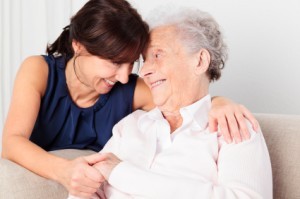Today, in the second part of a two-part interview (read part one here), SevenPonds spoke with Mercedes Grace Laurencin, M.D. M.P.H. about the interpersonal, social and psychological aspects of providing primary care as a physician. Her retainer medical practice, based in Santa Cruz, California, places special emphasis on accessibility issues for elderly and terminally ill patients, with a focus on holistic patient-centered care.
Juniper: In your experience, is a lack of community a significant issue for your patients?
Dr. Laurencin: I think it’s a growing issue as everyone gets older — trying to sort out who and what constitutes your community. I have a lot of patients saying they want to live in their homes for as long as possible. But, once they start having difficulties walking and can no longer drive, that house becomes a prison, and so services have to come to them. If you’re living in a community like mine, there aren’t many services that can come to people, and if you don’t have a solid community around you, which many people haven’t, this becomes a big issue.
I recently read about a woman in the Beacon Hill area of Boston who is trying to start up a community organization in which you pay a nominal annual fee that essentially gets you a handy person to come and do things for you, which is a big deal when you can’t do things yourself anymore. In the acute rehab ward, I see 70 year-old guys who fall off of ladders changing a light bulb because they’ve got a chronic illness and they lose their balance. So it’s very beneficial to have someone who you feel safe having in your home, who you can call to help you when your heating filter needs to be changed and things of this nature. When my children were young, I tried with a few other people to share daily meal preparation duties when we realized that we were all rushing home at the same hour to put the same pot of noodles on the stove for the kids. That didn’t really work out, and the issue continues on when people get older.
Many of my patients are very isolated. They may have professional caregivers who are very good at what they do, but they are not of the same age, life stage, or have similar interests as the patient. Maybe the patient used to be a teacher or read a lot, and is now with someone who doesn’t really speak their language or have background to hold meaningful conversations. It’s just not the same as having a community of like-minded individuals.
Juniper: How do you support the family and primary caregivers of your elderly or terminally ill patients?
Dr. Laurencin: Primarily through communication. The structure of my retainer practice allows me more time for this, to help families understand what’s going on. The worst thing you can do as a physician is to not have had any anticipatory conversations with a patient’s family, so that when a patient ends up in the emergency room, everyone’s surprised, and maybe it shouldn’t have been such a surprise that this would happen eventually. I call, email or otherwise contact a designated family member to give them an update after every appointment so that they know what’s going on. They’ll also call me to say things like, “Mom is having more difficultly walking these days,” or, “Mom is falling down a lot recently and we don’t know why.” So, when I go to see my patient, I ask them about whether these things are a problem for them, being aware that everyone has a narrative about their symptoms that may or may not accurately reflect their medical situation. I’m aware of things like denial and inference, and try to translate that through the medical chart, family situation and available resources.
Juniper: You are committed to helping your patients seek alternative, non-western healthcare advice if they so choose. Do you incorporate any non-western techniques or values into your own practice?
Dr. Laurencin: I have my boards in Integrative Holistic Medicine – I sat for the exam a few years ago. I am someone who tends to learn a lot when I have a test to do [laughs]. I have no problem with patients using alternative therapies. Western medicine is great for telling you what’s happening to you, but it’s not so great for treating it (pharmaceutical companies notwithstanding). I tell my patients that there’s a chasm between being ill and just not feeling well. I’ll have patients with multiple medical problems who are actually feeling quite good, and patients who have multiple symptoms and feel lousy, but we’re not sure what the source of them is.
Alternative therapies, because they’re not necessarily operating on the germ theory, have a lot of freedom within their respective disciplines to help patients just feel better. Sometimes, I think that alternative or integrative therapists are better at getting to the root cause of things. Even though I think I’m a pretty good doc, I’m sometimes surprised at what one of my patients’ alternative practitioners have to say about their condition – it will make a lot of sense. I retain this experience in the back of my mind for future situations and patients; it’s also a slice of “humble pie,” which is a good reminder that there’s just so much that we don’t know. I do, however, steer patients away from alternative practitioners that have an “I will save you” message, because they tend to retain patients for longer than is beneficial.
I’m lucky here in Santa Cruz to have a solid network of talented professionals who communicate with me about what they’ve been trying with my patients – what’s working and what’s not. It’s a collaboration. We co-manage a patient’s condition. There is no need for patients to feel shame or the need for secrecy around seeking alternative treatments – it’s better than someone self-medicating or not getting care.
Juniper: In your opinion, is Western medicine’s greatest strength in enhancing quality of life or in prolonging it?
Dr. Laurencin: I’m not 100 percent clear that Western medicine is geared toward prolonging quality of life. It’s more focused on treating symptoms and doesn’t always do a good job of it.
There are patients who are given medications for their heart, for example, but they feel lousy on it. So, they go to their doctor, who says that their blood pressure is fine, but doesn’t validate or treat the unwell feeling. It may be great that your blood pressure is doing fine, but what use is that if you have a chronic cough, vertigo, or can’t get out of bed? We have an evidence-based medicine practice, which means that oftentimes we’re practicing to the number, not to the patient. We have medications that do what they’re supposed to do, so we can prolong life, but not necessarily the quality of it. The side effects of these drugs can become more restricting and uncomfortable on a daily basis than the condition they are supposed to treat, so the question then becomes: Can we cut down on some of the stuff that we’re prescribing to patients? They will often ask me if they can get off some of their medications, and it’s better for them that I, or any doctor, take a thoughtful look at reducing their drug intake as opposed to them arbitrarily deciding to stop taking certain medications because they feel it’s just too much.
I had a patient who chose to give up some of her medication, even when I said that it may reduce her life expectancy by two years. She had some specific things she wanted to get done, and her medication was interfering with her feeling well enough to do that. Palliative care is the closest that modern medicine has come to asking patients, “How do you feel?” I’m a big proponent of talking about palliative care before “end of life” — we should be having these discussions when there’s any major decision to make about how to proceed with treatment.
Juniper: Is having “more time” a primary concern of your patients who are contending with terminal illness? Is there ever a point at which you would counsel against striving for “more time” to live, in favor of giving patients time to emotionally and psychologically come to terms with their mortality as they are dying?
Dr. Laurencin: I don’t think that’s my decision to make. My role in this is to listen, and answer the questions floating in the air like, “Doc, how much time do I have?” and “Is there a way for me to feel better?” With some patients, time is what they want, and they’re willing to go through anything to get it. It’s not my role to tell them whether length of time is important or not. In the case of terminal illness, I will tell them how far it has progressed, what their treatment options are and discuss what their goals are in the time they have left. I had a patient in palliative care who was trying to finish writing a book; as long as he was awake, alert and not crippled by pain, he wanted to finish. At a certain point, I had to say that there are forces beyond our control that would prevent him from finishing the book in the time he had left, and I think he took that to heart. By the time he died, he had arranged for other people to continue his work. He realized that the book was less important than getting the information to the next generation.
My son is getting married in a year, and, come hell or high water, I want to be there. I will go through anything to make sure of it. But other people want to live the days they have with as much enjoyment as possible, and choose to forgo treatment like palliative chemotherapy.
At the last hospice conference I went to, the oncologists said that they are trained to be optimistic. It made so much sense, then, that in the most extreme circumstances they will still try a new treatment. Sometimes this benefits a patient who is really fixated on “more time,” but not so beneficial for those who are at the end of a third treatment and debating a fourth. At that time, the discussion about palliative care needs to happen, but some oncologists will get upset with a patient or see them as losing hope or getting depressed if they don’t want to try the next thing. Some oncologists consider a patient’s decline in health as a failure of their medical expertise; some of these patients will end up in hospice two weeks before they die, which prevents them from receiving the benefits of that environment, including psychological care and transition time.
The personal and family history of those patients who are being “pulled through” the last stage of their life is also a consideration for me. If a patient has spent three weeks in the ICU because of heart failure, and has a recent medical history of “pulling through” each major decline, and if there are family members pushing for more treatment, it is often the case that no one wants to talk about other options for the time when “pulling through” can no longer realistically be the goal. It is especially difficult to have this conversation in a hospital, in the middle of that celebratory “pull through” time. Western medicine can “pull people through,” but if we’re talking about quality of life, it’s oftentimes best to have the conversation about treatment goals shifting within a time frame where outpatient palliative treatment is still an option. This way patients can think about it at home, and have more time to enjoy their life than trying to torturously prolong it.
My son is currently in med school, and his training includes a module on palliative care. I think this will make him a much better physician than he would be without this awareness. Almost every hospital is now developing or already has a palliative care team, so I think that these end-of-life conversations will be happening more frequently, skillfully and earlier on in a patient’s treatment plan. That’s a big step.
Juniper: Thank you so much for your reflections.
Dr. Laurencin: Thank you for the conversation! It’s been a welcome opportunity to take a step back and look at the larger picture of what I do.

 What Are Collaborative Doctor-Patient Relationships? An Interview with Dr. M. Grace Laurencin, Part Two
What Are Collaborative Doctor-Patient Relationships? An Interview with Dr. M. Grace Laurencin, Part Two






 Funeral Home Owner Chris Johnson Spending Halloween in Jail
Funeral Home Owner Chris Johnson Spending Halloween in Jail
 Our Monthly Tip: Toast a Loved One with a Personalized Glass
Our Monthly Tip: Toast a Loved One with a Personalized Glass
 My Cousin’s Death Taught Me the Meaning of Life
My Cousin’s Death Taught Me the Meaning of Life














